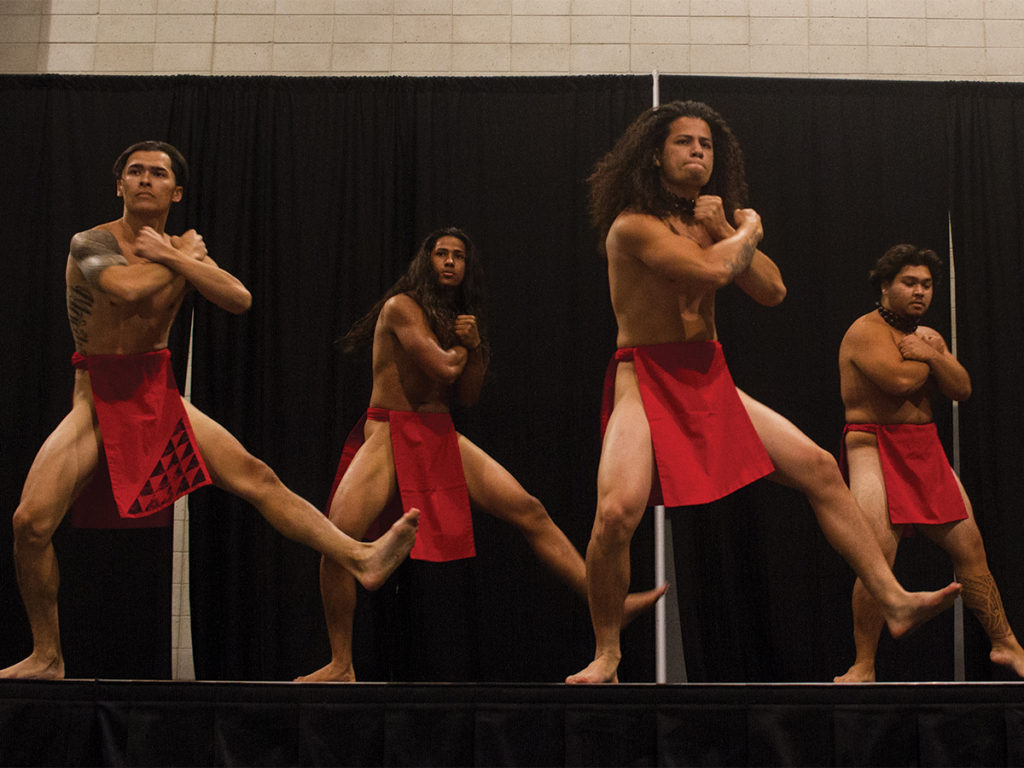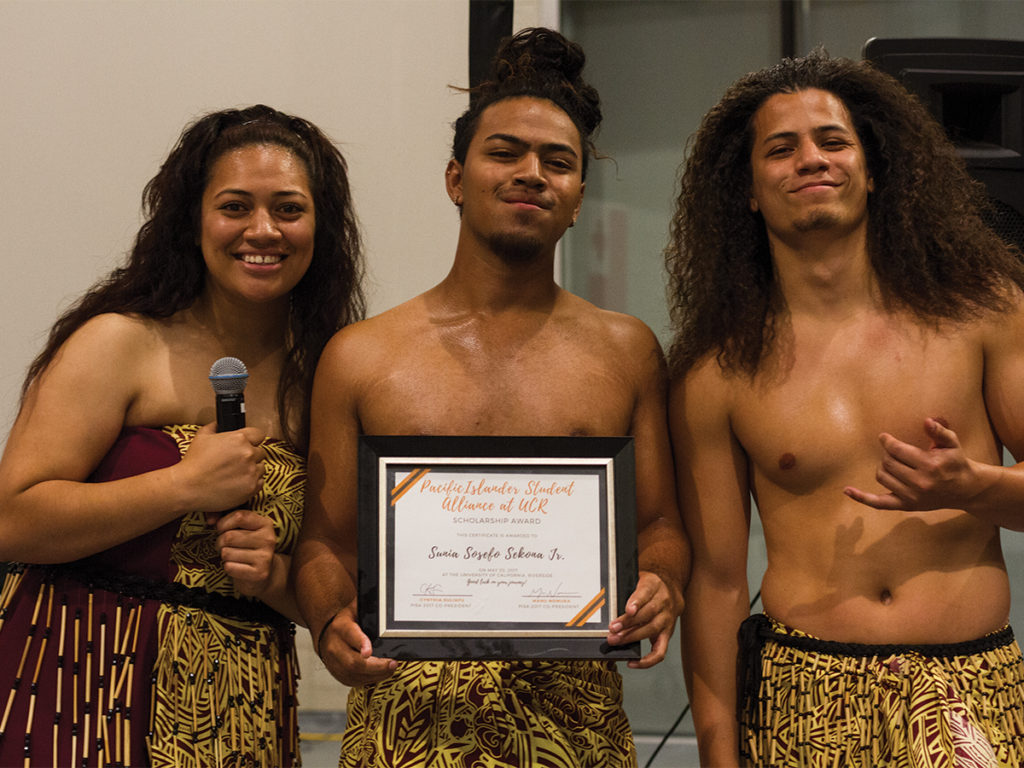
Martin Lopez/HIGHLANDER
On the evening of Saturday, May 20, dozens of tables covered by white cloth linens and bouquets of orchids adorned the SRC Mac Gym. Families with both elderly individuals and young children filled the gymnasium in semi-formal clothing, deeply anticipating to see their brothers, sisters, children, grandchildren, cousins and friends on stage.
Nesian Breakthrough was the Pacific Islander Student Alliance (PISA) at UCR’s ninth annual cultural show and aimed to share “inspirational figures across Polynesia, Micronesia and Melanesia who have broken through barriers in statistics to get to where they are through higher education,” stated public relations officer of PISA and second-year anthropology major Telesia Hunkin. “Specifically we’re showing an inspirational (person) from each one in between cultural performances.”
Before the show began, the audience — which was actually more of one collective family than an audience — enjoyed the food catered by local Riverside restaurant Best Thai and the music played by the live DJ, Westafa, who was the cousin of co-president and third-year business major Manu Nomura and has been touring with R&B singer J Boog for eight years.
While families waited for the first performance, a slideshow of the events PISA held within the past year was displayed. The pictures and videos included the group practicing the dance numbers for the show, hosting their spam musubi stand during one of the nooners, cutting meat and preparing food at a family member’s house and supporting co-program coordinator and second-year public policy major Roy Tongilava, who earned a seat in the student government for the 2017-2018 school year as a CHASS senator.
Debuting the event was a Fijian number by the PISA girls, who wore black shirts and skirts, had black face paint on each cheek and used paddles for their dance.
Intertwined between each dance performance were raffle giveaways for gift baskets and presentations given by club members to inform audience members about a Polynesian, Micronesian and Melanesian figure. The first presentation was about general statistics of Asian Pacific Islanders given by Hunkin. She revealed that at UCR, there are 22,921 students, and out of all of those, only 84 identify as Asian Pacific Islander. She said that API’s are “commonly lumped together as if they have the same traits and cultural heritage,” which is what each cultural presentation aimed to disprove.
Also present at the event was the Guardian Princess Alliance, founded by media and cultural studies professor Setsu Shigematsu, who works closely with PISA. There to speak about the alliance was fourth-year media and cultural studies major Priscilla Melo, who gave a brief speech to the audience about the organization’s aim for racially diverse princesses and its newest book, “Leilani and the Lanu Tree,” which she said aims to “teach about compassion, respect and embracing the Pacific Islander culture.”
The cultural figures presentation started with Micronesia, which was presented by outreach coordinator Sirena Fanua and historian Eddie Gage. Their figure was Tony Babauta, an assistant secretary for insular affairs under the Obama administration and a Guamanian native.
The performances shifted to Tonga, with historian Lusiana Waniqolo presenting a Tongan Tau’olunga solo dance to “Fanga’i Lupe” by Spawnbreezie. As she danced, people ran up to throw money at her, a tradition that followed for subsequent performances, and some of which stuck to her body because of the body oil that all of the performers used for shine. After, four male students from Centennial High School performed a Tongan dance to “Lupeolo” by Kiwini Vaitai.
By the time their dance was over, the entire crowd must have been broke from all of the money they tossed to the performers.
After, Waniqolo returned to give her Melanesian breakthrough performance with treasurer Keilani Conner, both of whom chose politician Jiko Luveni, Fiji’s first female speaker. Luveni graduated in dentistry from the Fiji School of Medicine and was the first Fijian female to do so, a feat that Waniqolo described as substantial because “traditionally in Fijian culture, women are placed last and men and children are first.” Because of Luveni, she continued, “it is now accepted for women to pursue higher education and something greater.” Conner’s grandmother, B. Rene Norma, was active throughout the event, running up to the front to take photos for nearly every cultural performance. “We most definitely need to have more events like these. It’s a wealth of information that you’re exposed to. Just because someone has studied and is teaching (about a culture) doesn’t mean they have lived that experience,” expressed Norma.
The PISA girls united to present a Tahitian number, which involved hip-shaking and feather headdresses. By the time their dance was over, the entire crowd must have been broke from all of the money they tossed to the performers.
Following a 10 to 15 minute intermission, Nesian Breakthrough travelled to the island of Hawai’i as part of their Polynesian breakthrough. Their first Hawaiian dance involved all males dancing to the song “Hawaii’an Kahiko” by Napua Me Kealoha. The motions were forceful as it presented itself as a series of stiff poses while a woman drummer sang along.
The Polynesian breakthrough, presented by social committee coordinator Pogisa Tau and historian Kamryn Sagiao, focused on Professor Dr. David Ga’oupu Palaita from City College of San Francisco, who recently appeared on NBC Bay Area News to talk about the Critical Oceanic and Pacific Islanders Studies program at CCSF.

(left to right): Cynthia Suliafu, Sunia Sekona, Manu Nomura
A sweet ukulele performance of “Nga Waka, Haere Mai, Kamate” united all of the PISA members once again, then the winner of the PISA scholarship was announced. Presidents Nomura and Suliafu first explained that they promote their goal of motivating Pacific Islander youth to aspire for higher education by tutoring at local high schools and offering scholarships such as the one about to be given. The winner, Sunia Sekona, a senior at Moreno Valley High School, revealed, “What really persuaded me to write the essay was my sister, who told me I have been through alot and I could win if I wrote through my heart.” He intends to use the scholarship money to fund for his education at Riverside Community College after high school.
Before the next presentation, the show was going to end early because of the SRC closing at 9 p.m. However, they were allowed to continue with the event if they cleaned up by 10 p.m., so the night moved on with guest speaker Deputy District Attorney of Alameda County Amilcar Butch Hunkin, a Samoan dance with the PISA boys to “Sau Ta O” by Nanai Ofisa Ofisa, a cover on behalf of Lisa Marie of “Leafaitulagi” by Sarah Jane and a closing performance by the entire PISA club. Soon after, everyone — audience included — joined in to help with the clean-up, since for Pacific Islanders, family comes first.








